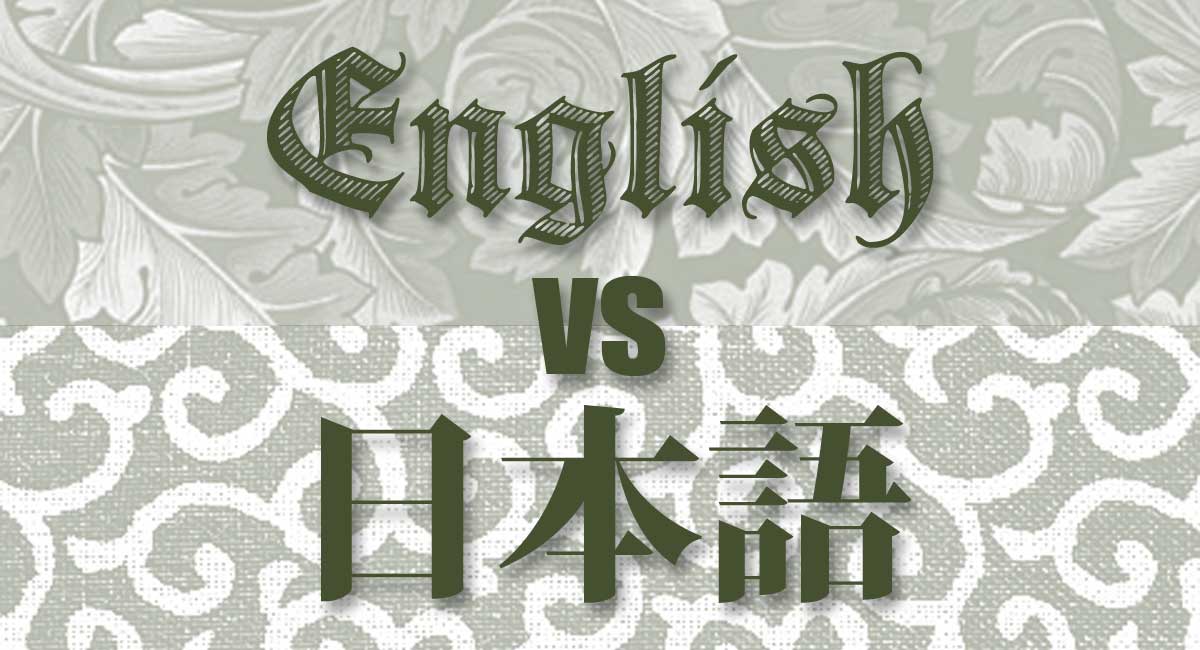
日本語では、カジュアルに話すとき、言葉をよく省略しますが、英語ではそれほど沢山の言葉を省略するケースはありません。日本語の世界ではできることが、英語の世界では…ということの重要な例です。この省略を英語でellipsisといいます。この点において、英語は日本語に比べてそれほど臨機応変ではない、と考えてください。この違いが原因となり、日本語ネイティブスピーカーの英語学習者が英語を話すときに、ミスをしやすくなります。実際に例をあげながら、考えましょう。
There is very important difference between Japanese and English. To put it simply, in Japanese, you can cut out a lot more words from your sentence when you speak casually. This is called "ellipsis". English is not as flexible as Japanese when it comes to cutting out words from your sentence. This difference is often the cause of many mistakes that Japanese speakers make when they speak English.
Consider this sentence in Japanese:
あなたは昨日銀行へ行きましたか?
If I translate this sentence exactly, word for word, then in English you would be saying:
You yesterday bank to went?
It sounds kind of strange, but I would understand what you mean.
In natural English, you would say:
Did you go to the bank yesterday?
When you speak informal Japanese, this sentence is much shorter:
昨日銀行行った?
A very close, word-for-word translation of this short sentence would be:
Yesterday bank went?
If you just said this, an English speaker would have trouble understanding exactly who or what you were talking about.
When you speak informal English, you still have to say:
You go to the bank yesterday?
Notice that you still must say "to the". Japanese cuts short words like 「に」 and so on.
In English, many people would still say:
Did you go to the bank yesterday?
The Japanese sentence went from 「あなたは昨日銀行へ行きましたか?」 to 「昨日銀行行った?」. That is from twenty kana to eight. The sentence has been cut by about 60 percent! The English sentence is almost the same length — the informal sentence is just three letters shorter. (If we measure the sentences in terms of sound, both sentences are basically the same length.)
| あなたは昨日銀行へ行きましたか? | Did you go to the bank yesterday? |
| 昨日銀行 行った ? | You go to the bank yesterday? |
Japanese often doesn't use pronouns and subjects
The first reason for this difference is that Japanese is a "pro-drop" language. "Pro-drop" comes from "pronoun drop". Japanese speakers don't use pronouns (pronouns are words like "he", "she", "it", "I" and so on) or subjects very much because they are clear from the context.
When I was learning Japanese, this was difficult for me. I always used to use words like 彼, 彼女, あなた and so on. It is quite unnatural in Japanese to use these words every sentence, but if I was talking about myself, I usually said 「私は…」 at the start of every sentence — 私は… 私は… 私は… I remember asking my Japanese teacher how I could say "it" in Japanese when I wanted to translate a conversation like this:
A: Did you see that movie?
B: Yes, I liked it a lot.
She explained that I did not need to say "it", but I was not comfortable with that. I wanted to say 「はい。その映画がとても好きだった。」 After a while, I started to realise that Japanese people don't use "it" or "he" or "she". (I still sometimes have to ask my friends when we speak Japanese 「誰が?何が?」 etc. to be clear about who or what we are talking about.)
If you compare two simple examples in English and Japanese, you can see that Japanese doesn't need to use pronouns much at all. In the English sentences, you need "I", "it" and "you" or your sentence is not complete:
| A: この写真は面白い。誰が撮ったの? B: 知らない。気に入ったか? |
A: This photo is interesting. Who took it? B: I don't know. Do you like it? |
Japanese drops particles
Japanese does something else that you can't do in English (for a number of reasons). In Japanese, you can often drop particles (てにをは) from your sentence and everyone still knows what you mean.
For example:
彼バナナ食べた。
Maybe you should say 「彼は」 and 「バナナを」, but everybody knows he ate the banana — the banana didn't eat him!
In a way, Japanese looks a lot like English when you speak like this because English doesn't use things like 「が」 or 「を」 to show the subject and object. The relation of the words is understood from the position: that's why you need to learn SVO. You wouldn't say 「バナナ彼食べた」, right?
Japanese cuts down verbs
In English, you can cut down some verbs. You can say "don't" instead of "do not", or "I've" instead of "I have".
In Japanese, you can cut down every verb and lots of verb constructions. Here are a few examples:
- 「でございます」 can be (replaced and) shortened all the way to 「だ」;
- 「行きました」 can be cut down to 「行った」;
- 「帰らなければなりません」 shortens to 「帰らなきゃ」; and
- 「食べられてしまいました」 is often 「食べられちゃった」.
In Japanese, you can even cut the verb completely, as in 「これいいね!」. You do not need to use 「だ」 at all! The English version with no verb "to be" ("This good, eh?") is bad grammar
English is more detailed
Looking at things from another point of view, Japanese is a very efficient language. It is lean. To me it is like a very logical, beautiful machine. In many cases, Japanese seems like it has been cut back to just the most important words. Speakers let listeners decide on the details themselves. This is because Japanese developed in a "high-context" culture—there is a lot of shared ideas and information between Japanese people. Historically, almost everyone in Japan was Japanese and they all spoke the same language. A lot of the time, you know that the person you are talking to knows what you mean.
On the other hand, English is fat. English has a lot of detail and nuance that it probably doesn't need for communication, but we like it! These are things like singular and plural, verb tenses, "the" and "a", the difference between "at the office" and "in the office" and so on. But these details are nice to have, and if you want to be good at English, you have to love these small details too.
This has happened for two reasons. Firstly, English is a very strange mix of languages like Latin, Danish and French, so we have many words for the same thing. Secondly, it is because English is a "low-context" culture. That means that English speakers tend not to share culture and ideas. This is even more true today when an English speaker can be from any country in the world. We need to speak accurately and in detail to make sure people understand us.
Consider this sentence:
This is pen.
Something is missing, right? An English speaker wants to know which pen you are talking about. Do you mean my pen, your pen, a pen, the pen, his pen, her pen or that pen? For a Japanese speaker, which pen is clear from the situation. It seems unimportant to say exactly which pen. Japanese leaves this information out:
これはペンです。
English speakers want to know the details. They like to know if you did it or you have done it. If you talk about something, they want to know how many there are. It makes a big difference to an English speaker if you talk with someone or at them. You can be in the bed or on the bed. "Food" and "foods" are not the same thing.
For Japanese people speaking English
For Japanese speakers learning English, there are some clear lessons here:
- Be very clear and give lots of details: You might feel like you are saying too much, but probably you have been saying too little.
- Be more careful with the small words: Japanese people tend to be careless with "a" and "the", with plurals (複数), with the "s" in third person singular verbs (三単減) and prepositions (前置詞). You can see this when they listen and repeat, or read out loud. People often skip past these details and miss them completely. Don't ignore the details. Pay attention to small words. They are important. Think about the difference you get from the ゛ in 「これが」 and 「これか?」!
- Don't cut words out of your English sentence: Most of the parts of an English sentence are important. Because you feel it is not important doesn't matter. You are speaking English for the benefit of the person listening to you. That means you have to speak in a way that is good for them, and so that they can understand you.
- It is possible to cut the first word of in a sentence in informal spoken English, and sometimes in writing. Quite often when the first word is not dropped when speaking, it is joined on to the next word in the sentence. In our example above, "Did you go to the bank yesterday?", when speaking, it might sound like "Djyou go to..." The first "d" of "did" is joined onto "you". So these words are still there, but they can be hard to catch in spoken English if you are not a native speaker.



